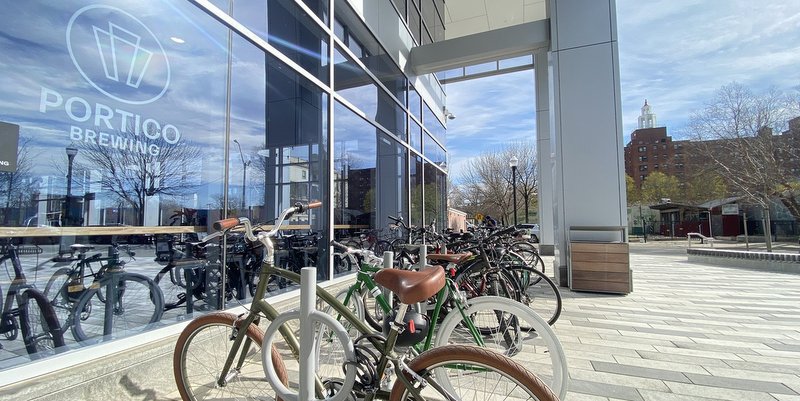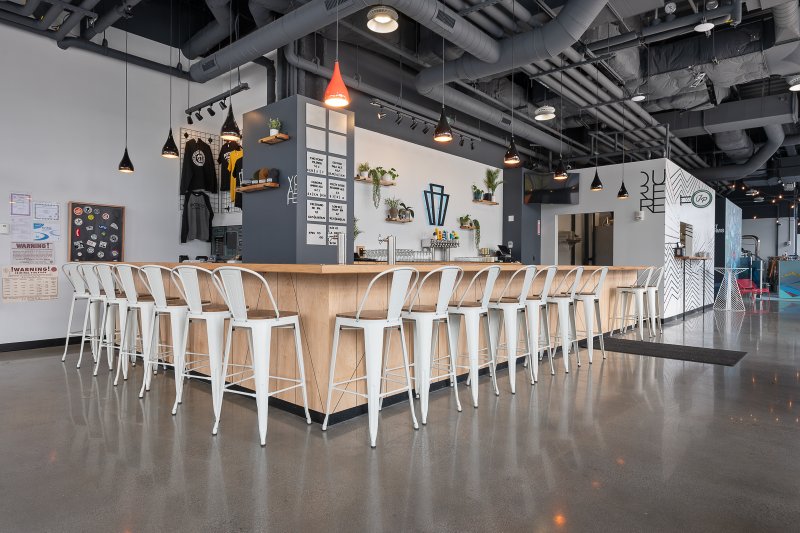
Portico Brewing believes that its business should be a force for good, especially when it comes to the environment. Formerly a contract brand, Portico debuted its own brewery and community focused taproom near the Somerville-Cambridge line in Massachusetts in spring of 2023 but started thinking about its impact well before opening. Cool ideas range from locating in a LEED Gold certified building, to supporting local non-profit groups that help protect nature and its ecosystems, to sourcing toilet paper made from 100% recycled content for its bathrooms.
It’s all part of what the brewery recently opened refers to as its environmental handprint, a net-positive approach to sustainability that acknowledges its energy and material footprint by countering with positive actions that benefit its community and the planet. The concept of the environmental handprint was developed by Gregory Norris of the Harvard School of Public Health.
Here’s a rundown of some of its plans.
Climate Actions: Portico operates using an all-electric brewhouse and kitchen. To power it, they’ve enrolled in the Somerville Community Choice Electricity program and selected the 100% Local Green option, which depends on renewable energy certificates (MA Class I RECs required by the Commonwealth) that come from solar, wind, anaerobic digestion, and low-impact hydro sourced in New England. Portico also tracks its energy use closely and is always looking for ways to be more efficient.

Plastic Proliferation: Portico was awarded a Reduce, Reuse, Repair Grant from MassDEP for a Taproom Reusables program that will help cut down and eventually eliminate all single-use plastic. Additionally, Portico offers a can carrier take-back program to help prevent the hard-to-recycle packaging from ending up in the waste stream. Instead, consumers can return the durable handles to the taproom so they can be reused over and over. Portico’s long-term goal is to eventually achieve official Zero Waste certification by ensuring that practically everything used at the brewery and taproom avoids landfill or incineration.
Sustainable Transportation: In addition to being accessible by public transportation, Portico is in the process of earning a Bike-Friendly Business certification from the Bike League. As part of the process, Portico supports the Somerville Bicycle Committee, Boston Cyclists Union and MassBike advocacy groups. Ample bike parking is available outside the brewery and there’s even a Bluebikes station right next to the building. Members of Portico’s staff participate in the Bike Month Challenge every May by ditching their cars and logging as many bike rides as they can.

Healthier Neighborhoods: Staff members volunteer as Tree Stewards for the Somerville and Cambridge Urban Forestry Initiatives (ask them about their Adopt-A-Tree programs). Portico has been adopted, named, and provides care for dozens of newly planted trees throughout the neighborhood. Portico also participates in cleanup events by picking up litter on nearby streets several times a year, and supports and partners with Groundwork Somerville which provides affordable produce grown by youth and other volunteers in what were previously barren lots.
Protecting local waterways: Portico supports the Charles River and Mystic River Watershed Associations and is a member of the Massachusetts Rivers Alliance, recognizing the importance of advocating for clean water, the primary ingredient in beer. Portico boards the Charles River Clean Up Boat every summer, taking part in the volunteer-led migratory fish count each spring, has adopted dozens of street drains in the neighborhood, and will offer special release beers to fundraise for the watersheds and highlight their importance.
Green brewery recognition: Along with some other sustainability-minded Massachusetts breweries, Portico is participating in an EPA Grant program to earn “green brewery” recognition by demonstrating its commitment to environmentally conscious business practices and advocacy. Portico has completed their initial assessment and will soon be implementing several new and innovative conservation and efficiency practices that were recommended.


